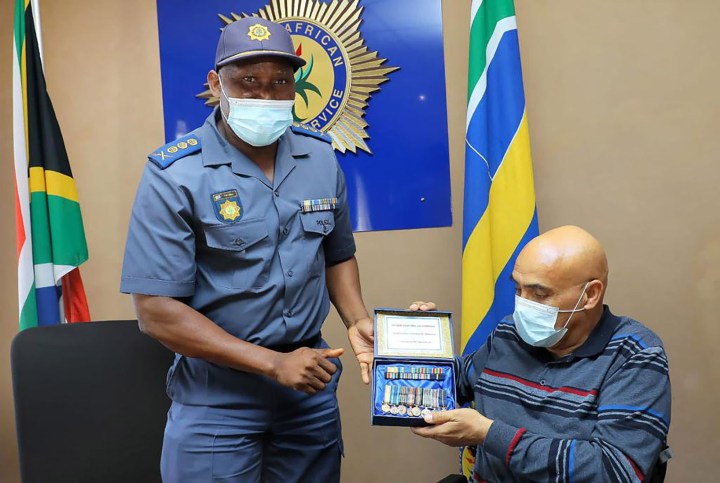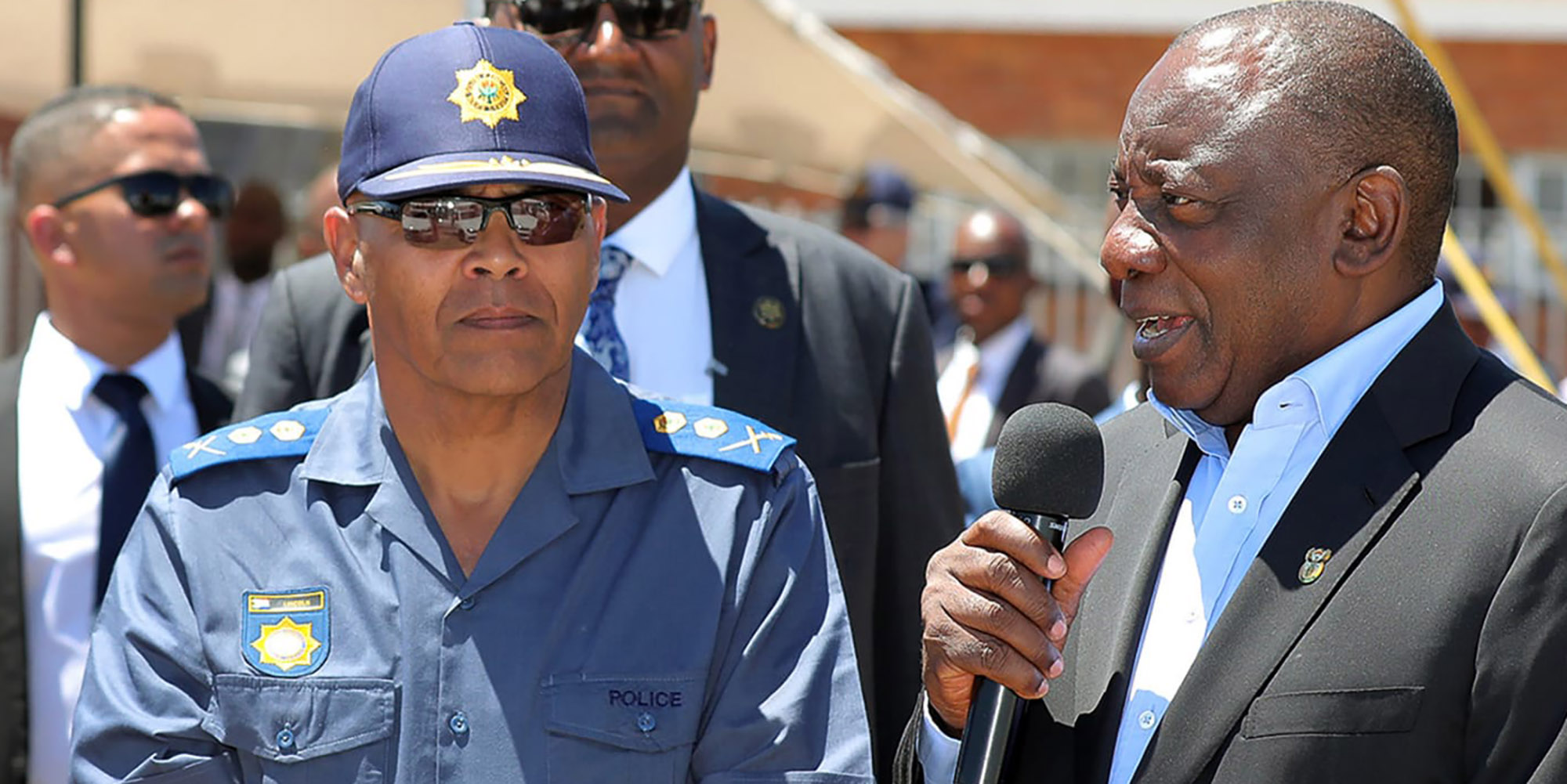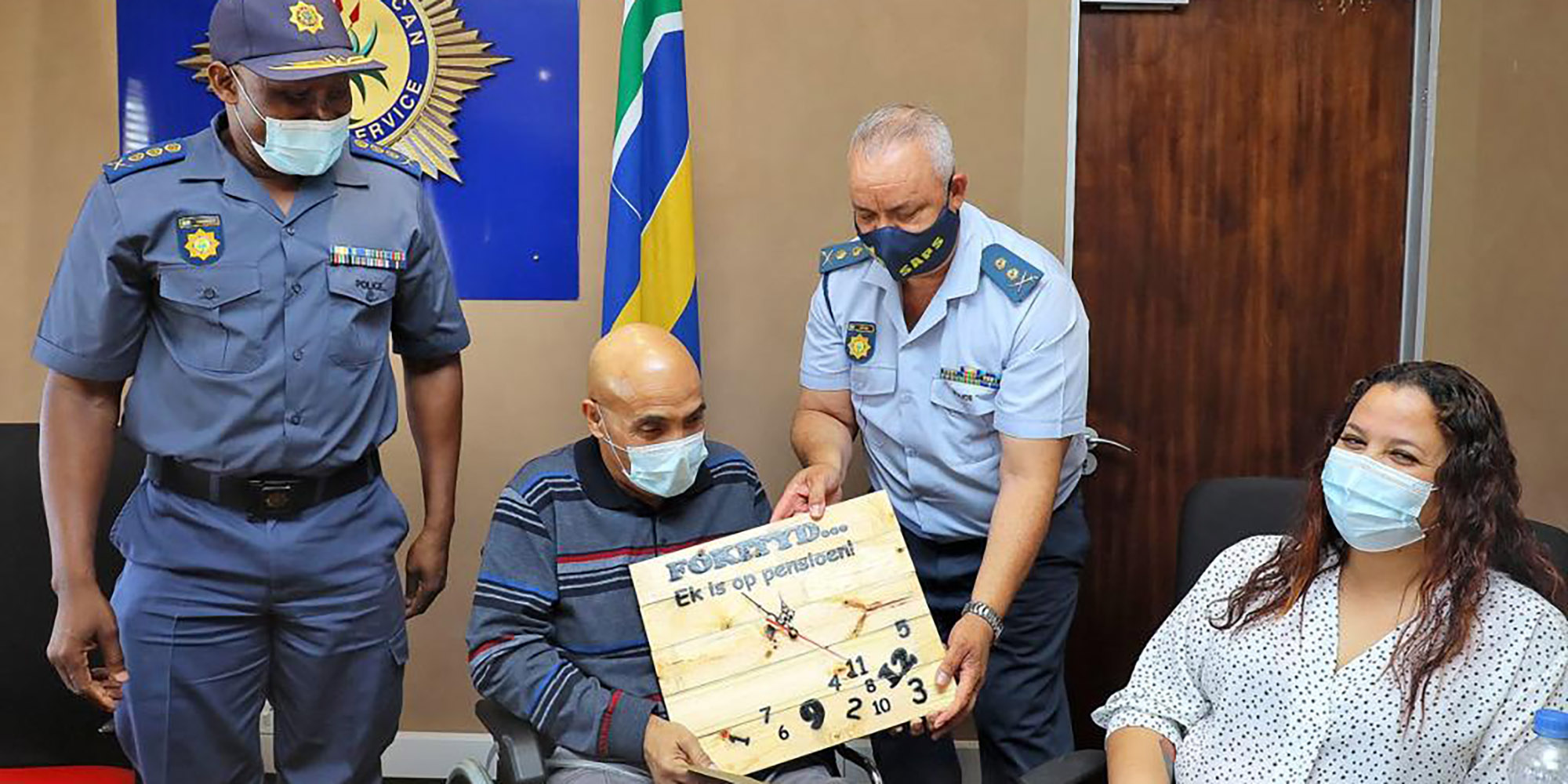ANDRE LINCOLN
Top WC cop retires after a momentous career, from protecting Madiba to tackling gangsters and fellow police

Andre Lincoln is bowing out after decades in the police service that saw two presidents — including Nelson Mandela, whose assassination he apparently helped thwart — entrust him with heading crime-fighting units, pitting him against crooks, some within the state.
Western Cape policeman Andre Lincoln has had a tumultuous career that has involved crafting South Africa’s intelligence arena following the fall of apartheid and going after some of the country’s most controversial suspects.
In between, he has faced criminal charges, been convicted and then acquitted.
His working environment has been cut-throat with overt divisions in the South African Police Service (SAPS) and cops’ names reportedly on hit lists.
Lincoln, who recently experienced serious health issues that resulted in both legs being amputated below the knee, turned 60 on 28 October and officially retired at the end of that month.
He was not available to provide comment to Daily Maverick, but told Independent Online that one of the lessons he learnt was that life could not be taken for granted because: “In the police, nobody who leaves for work in the morning is guaranteed to come home in the evening to his family.”
Advocate Johann Nortje, who has legally represented Lincoln since the 1990s, had a sombre take on Lincoln’s retirement.
Nortje said even though Lincoln had “served with dedication and distinction”, issues relating to his pension could affect him negatively: “He is left out in the cold as a disabled person with severe heart conditions at the age of 60, with only 11 years of his lifetime service being recognised by SAPS.”
Last week, Western Cape police spokesperson Colonel André Traut said a farewell function had been held in Lincoln’s honour. “As a decorated officer, his colleagues paid moving tributes to him for the role he played in fighting organised crime in the Western Cape. They congratulated and wished him well as he enters retirement,” Traut said.

Now retired Anti-Gang Unit Head Major-General Andre Lincoln and President Cyril Ramaphosa. (Photo: SAPS)
Another police spokesperson, Novela Potelwa, referred to some of the work Lincoln had been involved in.
“An ardent biker, [he] also championed on an annual basis under the banner of the SAPS Men for Change, a campaign against the scourge of gender-based violence and femicide during 16 days of activism,” she said.
“He and other bikers would ride along different towns of the Western Cape bringing awareness on gender-based violence and femicide.”
Here, via court records, previous reports and Nortje’s input, we piece together the decades of police work Lincoln has been involved in, along with legal battles involving other police officers that form part of South Africa’s interconnected crime, cop and political landscape.
Apartheid to early democracy
Based in Western Cape, Lincoln has a textured background rooted in South Africa’s intelligence sector.
Western Cape High Court papers dated 2017, relating to Lincoln taking on police bosses over previous action meted out to him, detail this history.
Under apartheid, Lincoln was a member of the ANC’s military wing Umkhonto weSizwe (MK).
He was head of the ANC’s department of intelligence and security in the Western Cape and was responsible for infiltrating the apartheid police’s notorious security branch.
In 1995, President Nelson Mandela appointed George Fivaz as national police commissioner to oversee the amalgamation of the country’s cop and security structures.
Lincoln dealt with the integration of MK operatives.
At the same time, Nortje was appointed director of the Western Cape police’s legal department.
Lincoln found the process of lumping pro- and anti-apartheid figures together tough because, according to court papers, he said, “we came from opposing backgrounds and we just didn’t trust each other when it came to the way forward within the new service”.
In 1995 Lincoln was also appointed to head the National Intelligence Coordinating Committee.
The committee’s functions, according to Western Cape High Court papers, included “to identify security threats, manage and neutralise them; and to oversee all covert operations within these structures”.
Lincoln, the documents said, was involved in identifying government department intelligence needs.
“He was [also] the chairperson of the Directorate of Covert Collection and he managed and oversaw covert intelligence operations between the military, secret service and SAPS crime intelligence.”
Around the mid-1990s, allegations surfaced that a senior policeman and Cabinet minister were among those on the payroll of Vito Palazzolo, who was based in Western Cape and once suspected of being the sixth-highest ranking member of the Sicilian mafia (Cosa Nostra).
(DM168 recently reported that Palazzolo, who was never convicted of a crime in South Africa, had visited the country recently after a spell in jail in Italy.)
Mandela, an assassination attempt, and mafia investigations
In June 1996, Mandela appointed Lincoln to head an elite investigative task team — the Presidential Investigative Task Unit (Pitu) — to look into allegations involving Palazzolo.
Nortje said certain cops retaliated and launched investigations into Lincoln.
Others Lincoln investigated included underworld figure Cyril Beeka (assassinated in 2011), rumoured to have been an intelligence operative for apartheid cops and later a faction of the ANC aligned to former president Jacob Zuma.
Lincoln’s unit started exposing alleged cop complicity in crimes.
“In collaboration with the American Secret Service, Pitu… uncovered the so-called Operation Donna in which counterfeit US dollars were being printed in the basement of the SAPS head office in Pretoria together with counterfeit matric certificates, university degrees and drivers’ licences,” 2017 Western Cape High Court papers said.
“According to [Lincoln], Pitu also took over the dormant investigation into an attempted assassination plot of President Mandela and in the process retrieved a handcrafted rifle.”
Lincoln once testified in court that the rifle was found hidden under the desk of a senior policeman in Pretoria, but that the investigation was smothered.
He had said there was resistance to Pitu’s investigations and complained about interference from other cops trying to find out what the unit was up to.
In later years and extending beyond the police service, this would become a red flag in terms of investigations uncovering State Capture and the case of SARS is an example.
Things dramatically swung against Lincoln. In February 1998 he was arrested on 47 criminal charges, including fraud and drunk driving.
Claims did the rounds that he was close to Palazzolo.
Four years later, in 2002, Lincoln was convicted of 17 of the 47 counts and the following year was sentenced to nine years in jail without the option of a fine.
He was kicked out of the police service.
The year Lincoln was convicted, Nortje left the police service and started legally representing Lincoln, whose pension at that point had been wiped out by legal costs incurred in the run-up to his firing.
Lincoln has always said apartheid-era cops framed him because of where his investigations were leading.
Zuma years — Arthur Fraser claims
Lincoln appealed against the court findings and in 2009, the year Zuma became South Africa’s head of state, managed to overturn the convictions and sentence.
In June 2010 he re-entered the police service.
Nortje pointed out, though: “Regrettably, his salary and pension was not reinstated retrospectively.”
Fast-forward to 2017 and Lincoln proceeded with a civil matter in the Western Cape High Court — he claimed R15-million in damages from the minister of safety and security (now the minister of police) relating to his time out of service and his belief that colleagues orchestrated a “malicious prosecution” against him back in the 1990s.
It was during this civil case that Lincoln, testifying in court, made claims against Arthur Fraser, who is widely viewed as a Zuma ally.
Lincoln testified that in the 1990s, when he faced criminal charges, Fraser, who once headed the National Intelligence Agency in Cape Town, asked him not to contest certain evidence and told him that he would be found guilty, but that the agency would see to it he spent no time in jail.
At the time Lincoln was testifying, Fraser headed the State Security Agency, which recently was alleged to have been totally skewed to favour Zuma and his ANC faction.
Fraser did not counter Lincoln’s claims in court, but these hinted at something amiss within intelligence structures.
In September 2017, it was ruled in the Western Cape High Court that the 1990s-linked prosecution against Lincoln had not been malicious.
A few months later, in February 2018, the political winds changed when Zuma stepped down as head of state.
Meanwhile, Lincoln forged ahead with appealing against the court finding and, in October 2018, was successful, with a ruling that the prosecution against him had been malicious — effectively vindicating him.
The saga did not end there.
The Anti-Gang Unit and Ramaphosa years
Around the time of his high court success, Lincoln was appointed to head the Anti-Gang Unit in Western Cape — a move President Cyril Ramaphosa endorsed.
Despite this promotion, the State Attorney, on behalf of some within the police, approached the Supreme Court of Appeal (SCA) to try to overturn his high court success relating to the Pitu malicious prosecution matter.
In June 2020, the ruling was overturned and the Constitutional Court subsequently dismissed an attempt by Lincoln to appeal against that.
The upheld SCA ruling left Lincoln with serious legal bills.
According to Nortje, it meant: “Lincoln must pay the legal costs of the SAPS and the costs of his own attorneys in the High Court, the Full Bench and the SCA which amounts to more than R5-million; Lincoln forfeits his salary for the period January 2002 [to] May 2010 and his pension for the period 1995-May 2010; Lincoln retires with only 11 years of service instead of 26 years.”
Nortje said Lincoln filed an application on humanitarian grounds to Ramaphosa and Police Minister Bheki Cele to abandon the SCA ruling.
It is understood Western Cape police commissioner Thembisile Patekile or the State Attorney may have the final say in this matter.
Police ministry spokesperson Lirandzu Themba previously told Daily Maverick: “Comment from the ministry is that this is a private matter between the state and General Lincoln, therefore we can’t give any comments.”
Aside from having to deal with legal issues stemming from the 1990s, Lincoln more recently faced other claims emanating from courtrooms.
He has also come up against police bosses.
In late 2020, Amaal Jantjies, a suspect facing charges relating to a hand grenade discovered outside Lieutenant-Colonel Charl Kinnear’s home late in 2019, claimed in court that Lincoln was involved in orchestrating the grenade incident.
Kinnear was assassinated outside his Bishop Lavis home in Cape Town in September 2020. He was a member of the Lincoln-headed Anti-Gang Unit.
It subsequently emerged that Jantjies was allegedly working with Nafiz Modack, one of several suspects arrested for crimes under investigation by the Anti-Gang Unit, including allegations police officers in Gauteng were creating fraudulent firearm licences.
The state later pointed to Modack, also an accused in the Kinnear murder case, as having orchestrated the grenade incident.
Convergence
Modack knew Beeka and, like Beeka, was suspected of having dubious ties to certain police officers — in other words, to the state.
Lincoln investigated both Beeka and Modack, albeit in different decades, and both times faced criminal accusations.
The first time, while investigating Beeka, he was accused of an array of crimes and pointed to apartheid-era cops as framing him.
The second time, while investigating Modack, it seemed suspects linked to Modack were accusing him of crimes.
This plot gets even thicker — an Anti-Gang Unit member (therefore a member of Lincoln’s team) was arrested for allegedly accepting bribes in exchange for tipping Modack off about police operations planned against him.
Lincoln also faced disciplinary processes relating to Kinnear’s security in the run-up to his murder.
This led to Lincoln approaching the Labour Court in Cape Town.
In an affidavit dated May 2021, Lincoln said: “The disciplinary proceedings against me [are] clearly a result of my disclosures against the senior generals for having accused them of failing to fulfil their duties and responsibilities as contemplated in the Security Policy…
“I believe that I am being persecuted by the SAPS because I made statements about the inaction of my seniors.”
Allegations still followed him, as did his rebuttals that fellow police officers were targeting him.
Lincoln faced internal charges over Kinnear’s security along with Peter Jacobs, the head of the police inspectorate who was controversially transferred from heading Crime Intelligence earlier in 2021.

It is important to remember a critical part of Andre Lincoln’s career: he was appointed to high-level investigative positions within the police service during presidencies before and after what so far appear to have been the most detrimental post-apartheid State Capture years. (Photo: SAPS)
Meanwhile, Daily Maverick reported that Jeremy Vearey, the former head of Western Cape’s detectives, who was fired at the end of May, believed fellow police officers were targeting him, Lincoln and Jacobs (all three have similar histories linked to the ANC).
“There is an orchestrated stratagem to get rid of Jacobs, Lincoln and I,” he said in court papers.
“We exposed corruption in the police and we diligently committed ourselves to the eradication of gang activities and police corruption,” Vearey said in court papers relating to his dismissal, which he was fighting.
Lincoln and those allied to him have faced many stumbling blocks in their career paths.
Despite what some may insist, claim and allege, the fact remains that Mandela appointed Lincoln to look into critical allegations when South Africa was a fresh democracy and Ramaphosa backed him as Anti-Gang Unit head when gangsterism was choking Western Cape.
In between those presidencies, Zuma was head of state and under his tenure, South Africa became State Capture central, with claims (later denied) at one point emerging that Zuma met Western Cape gangsters two years into his presidency.
Given his intelligence background, Lincoln must know many state secrets and has probably made many enemies over the years since the days of apartheid.
Accusations and allegations against him could continue surfacing long after his retirement and that could make his life tough if the state does not scrap the legal fees issue.
It is important to remember a critical part of Lincoln’s career: he was appointed to high-level investigative positions within the police service during presidencies before and after what so far appear to have been the most detrimental post-apartheid State Capture years. DM


















 Become an Insider
Become an Insider
The most unappreciated career in the world,I salute Genl Lincoln, SAPS is a snake eating its own tail,beset with corruption and to traverse this minefield ,where the water is calm at the top ,but it is what lies beneath !!!Disinformation is used by the enemies to throw doubt and shadow on many a career,but those in the know will not be misled , the sterling work by Andre Lincoln will be remembered in the echoes of eternity.
So this is how the ANC treats people that tramp on its toes.